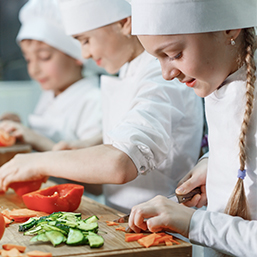
For many busy parents, sometimes it seems it’s easier to ‘just do it yourself’ when it comes to cooking for the family. When you’re in charge, you can control the nutritional value, measure how long it takes before it's on the table, and sometimes, most importantly, minimize the mess in the kitchen.
With all that in mind, children that develop culinary skills at an early age can have some significant advantages as they mature into adulthood.
Need some convincing? Here’s why kids should be encouraged to step into the kitchen to cook:
They know what they are eating. If someone has never made a nice tomato sauce, then how can they be expected to know what’s in it? Kids need to experience the ‘why’ of using certain ingredients to better understand the role they each play in creating a tasty recipe. As an example, at our Kids Cooking Programs, the number one vegetable kids seem to claim they dislike is onions, and yet, almost all of those kids would say that they love the tomato sauce that goes on their cheese pizza. But, when we tell them that the second main ingredient in tomato sauce is the dreaded onion, then follow up with a taste test of a tomato puree versus a well-balanced tomato sauce, they are all quickly converted. Knowing what you are eating can lead to a much better understanding of nutrition and how to eat a well-balanced diet.
They can exercise creativity to feel in control of the flavors. If we still have someone hesitant on onions, then we’ll offer leeks or shallots as a new substitute. This provides an opportunity to explain that they are all from the same family, but are made with different textures and flavor profiles. The dish should still work just fine, but the child feels more in control of the outcome. Don’t like butternut squash? Then how about yams or sweet potatoes? Don’t like celery? What about trying fennel instead? With the right cooking skills, they can put a new twist on a favorite recipe many times over, which keeps things interesting and also helps use up those extra veggies in the fridge too!
Things taste better when they do it themselves. Hesitancy to new or unfamiliar food can sometimes grow when kids are simply handed items with the expectation to eat them. When a child has been part of the process from start to finish, from the selecting of the vegetables themselves to presenting the final meal, they are far more likely to dig in and keep an open mind. When kids put effort into a task, they generally expect that the outcome will be more enjoyable. A plain, whole wheat pita bread is a very delicious item when you have made it from scratch yourself. However, if you provided a plain whole wheat pita in your child’s lunch, they might not gobble it down with exactly the same enthusiasm.
Making meals versus buying meals is a big cost saver. As children grow into teens and young adults, how they spend their money can often be a stressful reality. Having the skills to cook a simple, healthy meal for themselves at home – rather than purchasing each meal from a restaurant or prepared food outlet – can save significant dollars and potentially provide a better nutritional balance. Being in control of one's own finances and finding ways to save money is an essential life skill. If someone knows how to cook, then this is one more option for them to keep on track.
It’s clear that young chefs enjoy the opportunity of having flexibility in choices (within given parameters), along with the responsibility of creating something on their own. The feeling of independence they get from doing something as satisfying as feeding themselves and others can nurture their development as they age.
Cooking skills are not just life skills, but rather lifelong skills that will carry someone through to old age, so it’s best to start them young!
Cuisine et Château has been providing summer culinary programs for kids in the Calgary area for the past 12 years.
See our related articles:
Calgary’s Child Magazine © 2024 Calgary’s Child